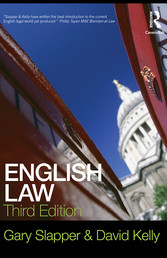
English Law

von: Gary Slapper, David Kelly
Routledge, 2009
ISBN: 9780203873786
Sprache: Englisch
43 Seiten, Download: 2227 KB
Format: PDF, auch als Online-Lesen
1 An introduction to law (p. 1-2)
1.1 Different approaches to law
There are a number of possible approaches to the study of law. One such is the traditional or formalistic approach. This approach to law is posited on the existence of a discrete legal universe as the object of study. It is concerned with establishing a knowledge of the specific rules, both substantive and procedural, which derive from statute and common law and which regulate social activity. The essential point in relation to this approach is that study is restricted to the sphere of the legal without reference to the social activity to which the legal rules are applied.
In the past, most traditional law courses and the majority of law textbooks adopted this ‘black letter’ approach. Their object was the provision of information on what the current rules and principles of law were, and how to use those rules and principles to solve what were by definition legal problems. Traditionally, English legal system courses have focused attention on the institutions of the law, predominantly the courts, in which legal rules and principles are put into operation, and here too the underlying assumption has been as to the closed nature of the legal world; its distinctiveness and separateness from normal everyday activity.
This book continues that tradition to a degree but also recognises, and has tried to accommodate, the dissatisfaction with such an approach that has been increasingly evident among law teachers and examiners in this area. To that end, the authors have tried not simply to produce a purely expository text, but have attempted to introduce an element of critical awareness and assessment into the areas considered. Potential examination candidates should appreciate that it is just such critical, analytical thought that distinguishes the good student from the mundane one.
Additionally, however, this book goes further than traditional texts on English law by directly questioning the claims to distinctiveness made by, and on behalf of, the legal system and considering law as a socio-political institution. It is the view of the authors that the legal system cannot be studied without a consideration of the values that law reflects and supports, and again, students should be aware that it is in such areas that the truly first-class students demonstrate their awareness and ability.
1.2 The nature of law
One of the most obvious and most central characteristics of all societies is that they must possess some degree of order to permit the members to interact over a sustained period of time. Different societies, however, have different forms of order. Some societies are highly regimented with strictly enforced social rules, whereas others continue to function in what outsiders might consider a very unstructured manner with apparently few strict rules being enforced. Order is therefore necessary, but the form through which order is maintained is certainly not universal, as many anthropological studies have shown (see Mansell and Meteyard, A Critical Introduction to Law, 3rd edn, 1999). In our society, law plays an important part in the creation and maintenance of social order. We must be aware, however, that law as we know it is not the only means of creating order. Even in our society, order is not solely dependent on law, but also involves questions of a more general moral and political character. This book is not concerned with providing a general explanation of the form of order. It is concerned more particularly with describing and explaining the key institutional aspects of that particular form of order that is legal order.
The most obvious way in which law contributes to the maintenance of social order is the way in which it deals with disorder or conflict. This book, therefore, is particularly concerned with the institutions and procedures, both civil and criminal, through which law operates to ensure a particular form of social order by dealing with various conflicts when they arise.
Law is a formal mechanism of social control and, as such, it is essential that the student of law be fully aware of the nature of that formal structure. There are, however, other aspects to law that are less immediately apparent, but of no less importance, such as the inescapable political nature of law. Some textbooks focus more on this particular aspect of law than others, and these differences become evident in the particular approach adopted by the authors. The approach favoured by this book is to recognise that studying the English legal system is not just about learning legal rules, but is also about considering a social institution of fundamental importance.







